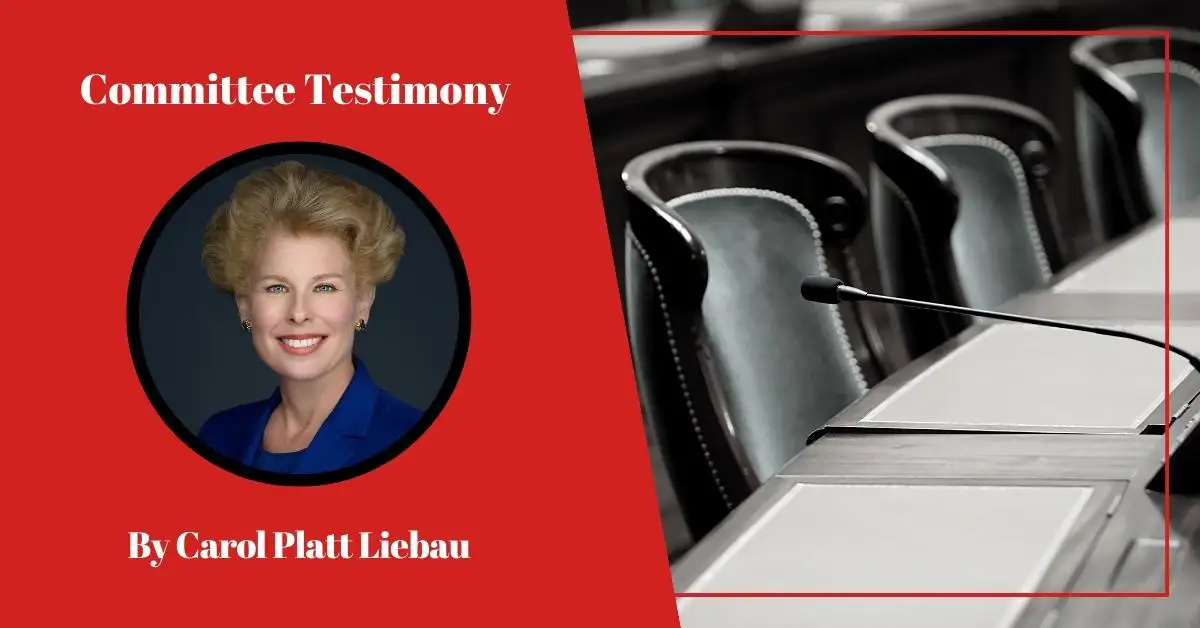Thank you for the opportunity to provide testimony on S.J. 36 or the Resolution Proposing a State Constitutional Amendment Concerning Environmental Rights. My name is Carol Platt Liebau, and I am the President of Yankee Institute — the eyes, ears and voice of hardworking people who want a prosperous Connecticut. Our common sense solutions drive positive legislative results to strengthen our communities and build a vibrant, hopeful future.
Certainly, all of us have an obligation to protect the environment and a shared interest in doing so. Amending the state constitution to provide every resident of Connecticut with an individual right to a “safe and stable climate” sounds like a wonderful idea. In theory, it is.
But in practice, it will create some very undesirable outcomes. Amendments like this give people the right to sue the state — or any business — because the climate isn’t clean enough. The result is litigation for our state, towns, and businesses.
Recent news reports detail that environmental NGOs are staffed, funded, and eager to bring enforcement suits based on statutes like the one before you today. These groups effectively function as plaintiffs’ environmental firms. The combined numbers for these groups — including Earth Justice (with 200 attorneys), the Sierra Club (with 39 attorneys), the National Resource Defense Council (with 40 litigators), and the Environmental Defense Fund (with 1,000 full-time staff) and more — totals in excess of 500 attorneys working nationwide and more than $1.5 billion in assets with which to litigate.
In fact, amendments in Montana and New York have resulted in lawsuits blocking housing, economic development, and other infrastructure projects that improve the quality of life. Those wishing to block the construction of affordable housing will not hesitate to claim this housing denies them a safe and stable climate if the amendment passes.
The lawsuits this amendment would create — against businesses and government alike — are expensive. We all know what happens when businesses incur more costs. They pass them along to consumers in the form of higher prices. When the state or town incurs more costs, they get passed along to taxpayers in the form of higher taxes. Either way, life in Connecticut becomes more unaffordable. Our people suffer, or they leave.
Giving individuals the right to sue the state for a “safe and stable climate” also means we could end up with an intrusive regulatory regime that no one even voted for. Activists could sue and then extract settlements imposing rules so burdensome and expensive that no legislator would ever have voted for them.
The amendment’s vague language increases the chances of litigation. There are no definitions or goals attached to the amendment’s “safe and stable climate” wording, which opens the door to endless lawsuits. Similarly, the amendment insists that the state shall not allow any avoidable degradation of the natural environment. Does it therefore require the banning of all gas-powered cars? Can warring neighbors sue one another for unwanted barbecue smoke in their “climate” or can people, who move next to a transfer station, sue to close it down? We all share an interest in a clean and healthy home here on earth for ourselves and our families. But this interest must be balanced with others — including the importance of a functional, affordable state where our families can stay, grow and prosper.
Because it will make our state even more unaffordable for working people, increase the cost of living, block economic development and necessary infrastructure, reduce the quality of life, and increase the likelihood of protracted litigation for our businesses, state and towns, I urge you to vote no on S.J. 36.
Thank you.
Respectfully submitted,
Carol Platt Liebau
President

